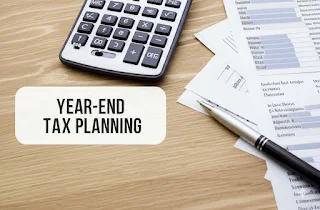Year-End Tax Planning: Strategies to Minimize Your Tax Liability
Hello fellow CPA candidates! As the year draws to a close, it's a crucial time to review your financial situation and take proactive steps to minimize your tax liability. Having navigated the CPA exam myself and spent years in public accounting, I've learned firsthand the importance of strategic tax planning. Let's dive into how you can analyze your projected income and expenses and explore options to potentially lower your tax bill.
Understanding Your Current Tax Picture
The first step in effective tax planning is to get a clear understanding of your estimated income and expenses for the current year. This involves:
- Projecting your total income: Include salary, bonuses, investment income, and any other sources of revenue.
- Estimating your deductible expenses: This includes potential itemized deductions like medical expenses (subject to AGI limitations), state and local taxes (SALT limitations apply), mortgage interest, and charitable contributions. Don't forget about above-the-line deductions such as student loan interest, IRA contributions, and health savings account (HSA) contributions.
- Reviewing your withholding and estimated tax payments: Ensure that the amount you've already paid in taxes throughout the year is sufficient to avoid underpayment penalties.
Tax Minimization Strategies: A Planning Scenario
Let's consider a common scenario: Suppose your projected taxable income is slightly above a threshold that would push you into a higher tax bracket. What options do you have to potentially reduce your tax liability?
Option 1: Maximize Retirement Contributions
Contributing to tax-advantaged retirement accounts like a 401(k) or a traditional IRA can significantly lower your taxable income. Contributions are often made with pre-tax dollars, reducing your current year's income.
Actionable Step: If you haven't already, consider maximizing your contributions to these accounts before the year-end deadline.
Option 2: Consider Tax-Loss Harvesting
If you have investments that have decreased in value, selling them can generate capital losses. These losses can be used to offset capital gains, and if your losses exceed your gains, you can deduct up to $3,000 of the excess loss against your ordinary income.
Important Note: Be mindful of the "wash-sale" rule, which prevents you from claiming a loss if you buy a substantially identical security within 30 days before or after the sale.
Option 3: Bunching Itemized Deductions
If your total itemized deductions are typically close to or slightly below the standard deduction, consider "bunching" deductions in a single year. For example, if you can prepay property taxes or make charitable contributions that you would have otherwise made in the following year, you might be able to exceed the standard deduction in the current year and itemize.
Consideration: This strategy works best if you alternate itemizing and taking the standard deduction every other year.
Option 4: Health Savings Account (HSA) Contributions
If you have a high-deductible health plan, contributing to an HSA offers a triple tax advantage: contributions are tax-deductible, earnings grow tax-free, and withdrawals for qualified medical expenses are tax-free.
Benefit: Contributing to an HSA not only reduces your taxable income now but also provides tax-free funds for future healthcare costs.
Option 5: Charitable Contributions
Donating to qualified charitable organizations can provide a valuable tax deduction. Remember to keep proper documentation of your contributions.
Tip: Consider donating appreciated stock directly to a charity. This allows you to potentially avoid paying capital gains tax on the appreciation while also claiming a deduction for the fair market value of the stock (subject to certain limitations).
Disclaimer
This blog post provides general information for educational purposes only and should not be considered as professional tax advice. Tax laws are complex and subject to change. It is essential to consult with a qualified tax advisor to discuss your specific financial situation and receive personalized guidance.
Stay tuned for more insights and tips to help you navigate the world of accounting and taxation. Good luck with your CPA studies!

